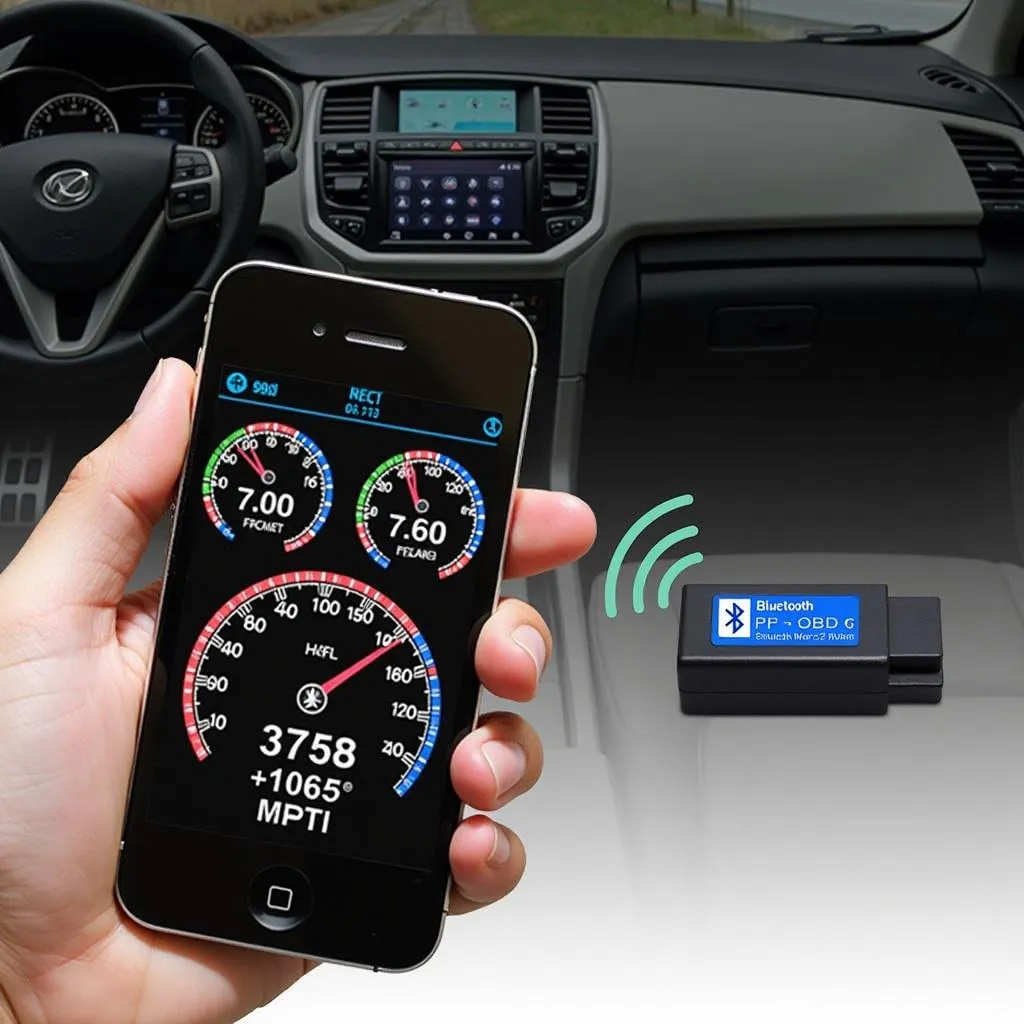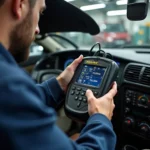OBD2 adaptors have become essential tools for mechanics and car enthusiasts alike, providing a bridge between your vehicle’s onboard computer and your diagnostic device. But with so many different types available, understanding what an OBD2 adaptor is and how it works can seem daunting. Let’s demystify these handy devices and explore their various uses and benefits.
What is an OBD2 Adaptor?
Essentially, an OBD2 adaptor is an intermediary device that allows you to connect your OBD2 scanner, code reader, or other diagnostic tools to your vehicle’s OBD2 port. This port, typically located under the dashboard on the driver’s side, acts as the vehicle’s data hub.
The adaptor translates the complex data from your car’s computer into a format that your diagnostic tool can understand. Think of it as an interpreter facilitating communication between two parties speaking different languages.
Why Use an OBD2 Adaptor?
OBD2 adaptors offer a range of benefits for vehicle owners, DIY mechanics, and professional technicians:
- Diagnose Engine Problems: Retrieve and understand diagnostic trouble codes (DTCs) to pinpoint engine issues, often before they become major problems.
- Monitor Vehicle Performance: Access real-time data from your car’s sensors, such as speed, RPM, engine temperature, and fuel efficiency.
- Reset Check Engine Light: After addressing an issue, use the adaptor to clear the check engine light on your dashboard.
- Customize Vehicle Settings: Certain adaptors allow you to modify specific vehicle settings, like automatic door locking or daytime running lights.
- Enhance Security: Some adaptors offer GPS tracking and security features, providing peace of mind for vehicle owners.
Types of OBD2 Adaptors
The market offers a diverse range of OBD2 adaptors, each with unique features and functionalities:
1. Basic Code Readers:
These entry-level adaptors provide a simple way to read and clear DTCs. They are often compact and budget-friendly, ideal for casual users.
2. Bluetooth OBD2 Adaptors:
These adaptors connect wirelessly to your smartphone or tablet via Bluetooth. Paired with a compatible app, they offer advanced diagnostic capabilities and real-time data monitoring.
3. WiFi OBD2 Adaptors:
Similar to Bluetooth adaptors, WiFi versions connect to your devices wirelessly, often offering faster data transfer speeds and a longer range.
4. USB OBD2 Adaptors:
These adaptors connect to your laptop or computer via a USB cable. They are generally preferred for professional use, offering stable connections and high data transfer rates.
5. Professional-Grade OBD2 Adaptors:
These advanced adaptors are designed for professional mechanics and workshops. They provide comprehensive diagnostic functionalities, bi-directional communication with vehicle systems, and compatibility with specialized software.
Choosing the Right OBD2 Adaptor
Selecting the ideal OBD2 adaptor depends on your specific needs and budget. Consider these factors:
- Vehicle Compatibility: Ensure the adaptor supports your vehicle’s make, model, and year.
- Features: Determine the specific functions you need, such as code reading, data monitoring, or customization.
- Connectivity: Choose between Bluetooth, WiFi, or USB based on your device compatibility and usage preferences.
- Software Compatibility: If you have specific diagnostic software, ensure compatibility with the adaptor.
- Budget: OBD2 adaptors range from affordable to high-end. Set a budget that aligns with your needs and usage frequency.
Conclusion
OBD2 adaptors have revolutionized vehicle diagnostics, putting powerful tools in the hands of car owners and professionals. By understanding the different types, features, and selection factors, you can choose the right OBD2 adaptor to unlock insights into your vehicle’s health, performance, and potential issues. Remember to invest in a reputable brand and always consult your vehicle’s manual or a qualified mechanic for complex diagnoses or repairs.

